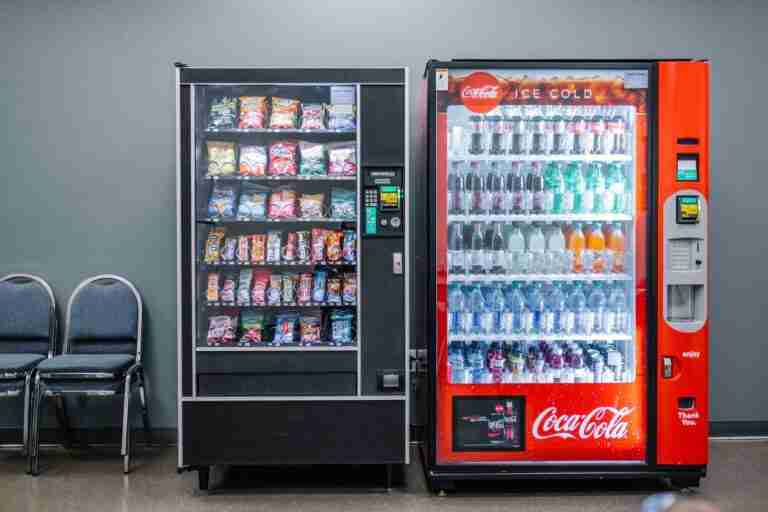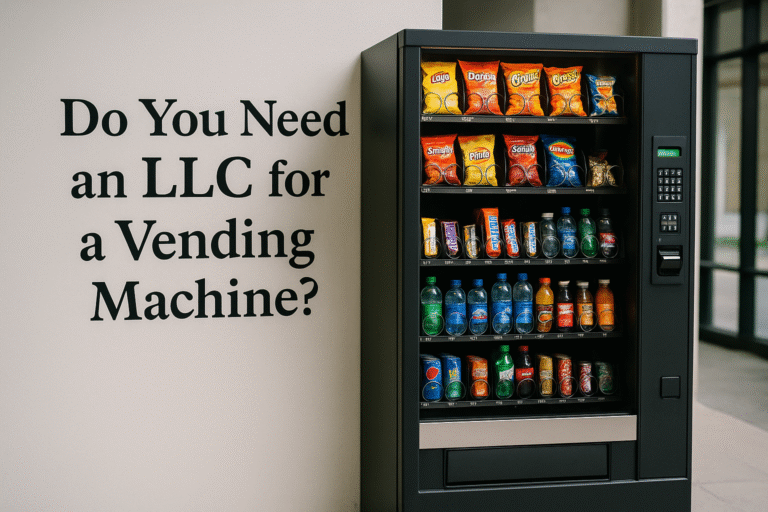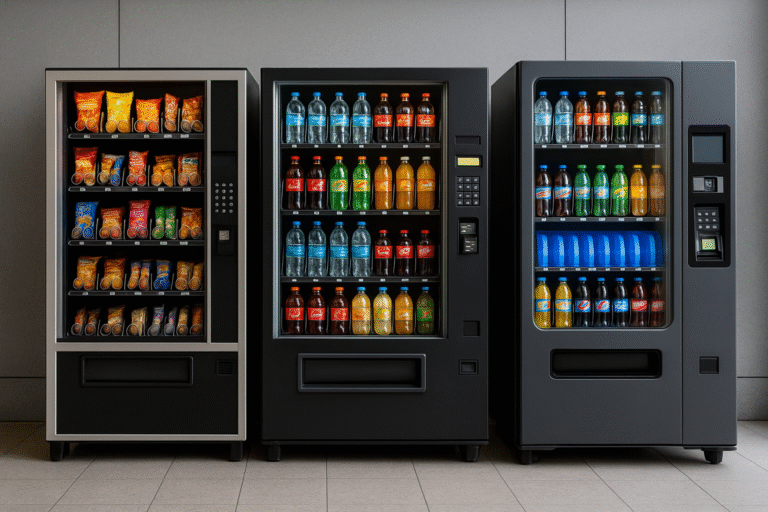¡Envío fijo a Puerto Rico: $1,200 en tu primera máquina y solo $375 por cada adicional! Envíanos un WhatsApp
Choosing YourPath: Pros and Cons of Owning a Vending Machine Franchise vs. Going Independent
In the world of vending machines, entrepreneurs stand at a crossroad: Franchise vs. Independent Vending. Both paths offer unique advantages and challenges. The choice, however, can significantly influence the trajectory of the business and its eventual success. This article delves deep into the pros and cons of both options, arming potential vending machine operators with the knowledge they need to make an informed decision.
Introduction to the Vending Machine Business Landscape
The vending machine industry has seen an exponential rise over the years, becoming a lucrative venture for many entrepreneurs. As they navigate the intricacies of this industry, a pivotal decision awaits them: Should they opt for a franchise or go the independent route? Both paths offer distinct opportunities and challenges.
In the bustling corridors of malls, offices, and transit stations, vending machines have become a ubiquitous sight. These automated sellers, dispensing everything from snacks to electronics, represent a dynamic industry that has continuously adapted to changing consumer preferences and technological advancements.
For those venturing into this domain, two prominent routes emerge. One can either align with an established brand, reaping the benefits of a tried and tested model, or embark on an independent journey, crafting a unique brand identity and operation. The subsequent sections delve into the intricacies of each choice.
Understanding Vending Machine Franchise Models
The allure of a franchise model lies in its established framework. When you buy into a vending machine franchise, you’re not just purchasing machines; you’re buying into a brand, its reputation, and a proven business model. This comes with a certain level of security and predictability, especially for newcomers in the industry.
Brands that offer franchise opportunities often provide a comprehensive package. This could include the vending machines themselves, products to stock, and even locations to place them. Additionally, franchisors often offer training programs, helping franchisees understand the business’s nuances, from machine maintenance to optimizing product selection.
However, while the franchise route offers a guided journey, it’s not without its constraints. Franchisees often pay an upfront fee, followed by regular royalties or a percentage of their earnings. This is the price for riding on the brand’s coattails, benefiting from its advertising, customer trust, and ongoing support.
Pros of Franchise vs. Independent Vending: Owning a Franchise
Choosing a franchise in the vending machine business often equates to a smoother start. Established brands carry with them a legacy of trust. Customers are more likely to purchase from a machine displaying a recognized logo, given the assured quality and service standards. This brand trust can significantly reduce the time required to establish a profitable operation.
Another significant advantage is the support system. Franchisors usually provide extensive training, ensuring that franchisees understand every facet of the operation. Whether it’s technical training for machine maintenance or business guidance on inventory management, franchisees have a safety net. This comprehensive support can be invaluable, especially during the initial setup phase.
Lastly, there’s the advantage of collective marketing. Franchisees benefit from national advertising campaigns, promotional events, and other marketing efforts initiated by the parent brand. Such widespread exposure can be challenging to achieve for an independent operator, at least initially.
Cons of Owning a Vending Machine Franchise
While the franchise route comes with several advantages, it’s not devoid of challenges. One of the most glaring issues is the cost. Franchisees usually pay a substantial fee to buy into the brand. This initial investment is followed by regular payments, often a percentage of the earnings, which can eat into profits.
There’s also the issue of autonomy. Franchisees must adhere to the brand’s guidelines, which might dictate everything from the machine’s look and feel to the products on offer. Such restrictions can be stifling for entrepreneurs who cherish creative freedom and wish to tailor their offerings to specific markets.
Moreover, being bound by a contract means franchisees have limited flexibility in making significant business decisions. Whether it’s introducing a new product line, altering the machine’s design, or even running local promotions, franchisees might find their hands tied, constrained by the brand’s overarching policies.
Exploring the Independent Vending Machine Business Route
Going independent in the vending machine realm signifies a journey filled with freedom and potential pitfalls. Unlike the franchise route, independent operators aren’t bound by any brand guidelines. This freedom allows them to tailor their business according to local preferences, often leading to innovative offerings that cater specifically to a niche market.
This route, however, demands a more hands-on approach. Entrepreneurs need to handle everything, from sourcing machines, identifying profitable locations, to crafting a distinct brand identity. Every decision, from product selection to pricing strategy, rests on their shoulders. This can be both empowering and daunting, especially when facing challenges without an established support system.
Yet, the joy of building something from scratch, watching it grow, and adapting it based on firsthand experiences is unmatched. Independent operators have the flexibility to pivot their business model, experiment with unique products, or even incorporate the latest technologies without awaiting approvals from a parent brand.
Pros of Going Independent in the Vending Machine Business
The independent route in the vending machine business is all about autonomy and limitless potential. Entrepreneurs have complete control over every business aspect, right from branding to supplier selection. This freedom can lead to innovative solutions tailored to specific market needs, something a franchise might struggle with due to its standardized model.
Another substantial benefit is the financial aspect. Independent operators aren’t burdened with franchise fees or any form of revenue sharing. Every penny earned goes back into the business or the owner’s pocket. This can lead to higher profit margins, especially if the operator can establish a strong brand presence and customer base.
Moreover, the independent route offers a genuine opportunity to carve a niche. Entrepreneurs can identify gaps in the market, cater to specific demographics, or even introduce unique products that a franchised machine might not offer. This flexibility can be a significant differentiator, setting the business apart in a competitive landscape.
Cons of an Independent Vending Machine Business Approach
Starting an independent vending machine business from scratch isn’t without its challenges. One of the most significant hurdles is brand recognition. Unlike a franchise that benefits from an established name, independent operators must invest time and resources in building their brand. This often means grappling with initial skepticism from potential customers.
A lack of structured support is another challenge. While franchises often benefit from training programs and operational guidance, independent operators are on their own. Whether it’s technical issues with the machines, marketing strategies, or inventory management, they must rely on their resources and expertise.
Lastly, there’s the financial perspective. While independent operators aren’t burdened with franchise fees, they might face higher initial setup costs. From procuring machines to marketing their brand, every expense must be borne by the entrepreneur. Moreover, without the collective purchasing power of a franchise, they might end up paying more for inventory and other necessities.
Cost Comparison: Franchise vs. Independent Vending
Money plays a pivotal role in determining the success of any business venture, and the vending machine domain is no exception. For those opting for a franchise, the initial investment might seem steep. Franchise fees, coupled with the costs of machines and inventory, can amount to a significant sum. However, franchisees often benefit from negotiated deals, thanks to the purchasing power of the parent brand.
On the other hand, independent operators, while free from franchise fees, might face other financial challenges. The costs of machines, branding, and initial marketing campaigns can quickly add up. Additionally, without the bargaining power of a large brand behind them, they might end up paying more for inventory.
However, it’s essential to consider the long-term financial picture. While franchisees part with a portion of their earnings, independent operators enjoy the full fruit of their labor. This can lead to higher profit margins in the long run, provided the business establishes a strong foothold in the market.
Evaluating Business Autonomy: Decision Making in Franchise vs. Independent Vending Models
Entrepreneurial freedom is often a significant consideration for those venturing into the vending machine industry. Franchises, with their established guidelines, can sometimes feel restrictive. Whether it’s product selection, pricing strategies, or marketing campaigns, franchisees often find their choices limited by the brand’s overarching policies.
Conversely, independent operators enjoy unbridled freedom. They can tweak their business model based on firsthand market insights, experiment with unique product offerings, or even introduce new technologies at their discretion. This flexibility can be a significant advantage, especially in dynamic markets where quick adaptation can be the key to success.
However, with great freedom comes great responsibility. Independent operators must be adept at making informed decisions, balancing risks, and rewards. Every choice, from the machine’s location to the products on offer, can significantly impact the bottom line. This demands a deep understanding of the market, customer preferences, and industry trends.
Making an Informed Decision: Franchise vs. Independent Vending
The vending machine industry, with its dynamic landscape, offers a plethora of opportunities for aspiring entrepreneurs. Whether it’s aligning with a renowned brand through franchising or charting an independent course, both paths have their merits and challenges.
Choosing the right model boils down to personal preferences, financial considerations, and long-term business goals. For those seeking a structured journey with established support systems, a franchise might be the ideal choice. On the other hand, entrepreneurs cherishing autonomy and the thrill of building something from scratch might find the independent route more appealing.
In the realm of Franchise vs. Independent Vending, success in the vending machine arena is anchored in dedication, deep market insight, and adaptability. Irrespective of choosing a franchised or independent path, a meticulously crafted strategy, combined with steadfast dedication, can steer the journey towards a lucrative and rewarding enterprise.
Conclusion
In the debate of Franchise vs. Independent Vending, both franchising and independent operations present their distinct set of advantages and drawbacks in the vending machine business. While franchises boast the benefit of an established brand and robust support system, they might demand higher initial fees and provide less operational flexibility. Conversely, opting for an independent route can grant greater autonomy, but it might necessitate more groundwork in terms of market research and brand development. The crux lies in evaluating personal preferences, financial constraints, and long-term business aspirations. With meticulous strategy and due diligence, either avenue can lead to a prosperous vending machine enterprise.




